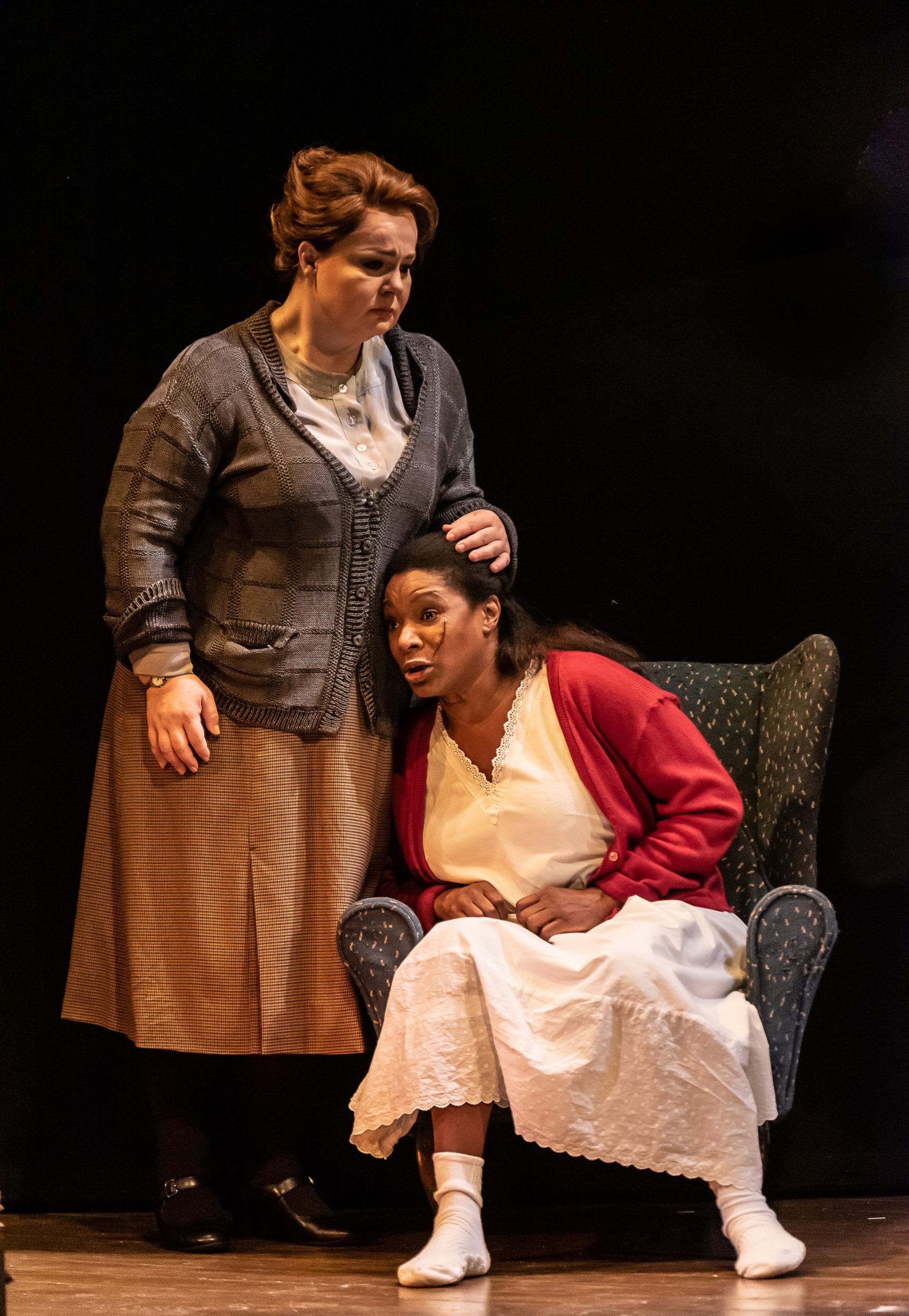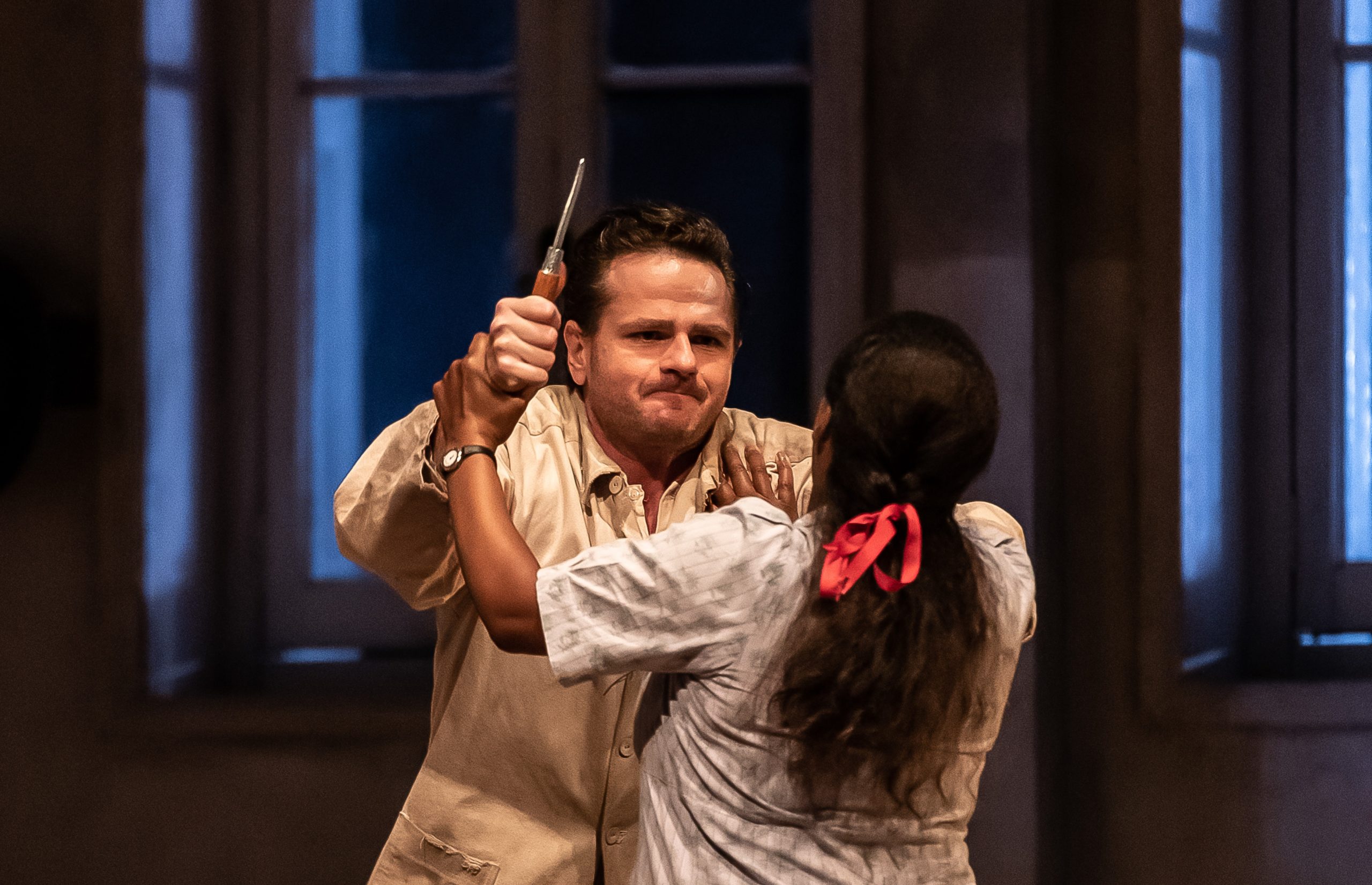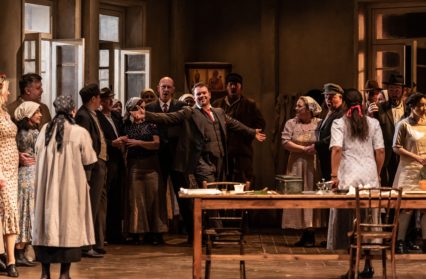Welsh National Opera continues its Spring season with the revival of Janáček’s Jenůfa – a scintillating production from the 1990s. Nigel Jarrett was at the first night.
Opera comes no more visceral than Janáček’s Jenůfa and no more vivid than in Katie Mitchell’s 1998 production of it for WNO. Revived once more in the company’s spring season, her realisation has lost none of the frisson that comes from the way she sets a depth of emotional complexity against a depiction along horizontal planes that’s almost cinematic. This was true of the première at the New Theatre in Cardiff, WNO’s former base, where conditions on stage and backstage were often cramped and where the production’s downstage activity might have seemed enforced rather than deliberate. On transferring to the Wales Millennium Centre for the first revival, there was no attempt to expand Vicki Mortimer’s set into the new home’s cavernous spaces, so that then as now and embedded in the stage’s large black curtain it resembles a cinemascopic rectangle, a night at the movies. It’s still effective, even though sight lines for that part of the audience sitting stage right are sometimes blocked. In this revival, Mitchell’s original is directed by Eloise Lally, with staff director Sarah Crisp.

Jenůfa has a libretto by the composer based on a play by a Czech writer, Gabriela Preissová, but its story of pride, honour, prejudice and infanticide among village folk is straight out of a 19th-century Russian short story or one by de Maupassant. Its machinations associated with the lineage of mill ownership are almost Shakespearian. Behind the drama, work continues: bags of flour are shifted, accounts are totted up, and the mill wheel – mimicked by the orchestra’s xylophone – rattles onward, like fateful life itself. In the concert hall and opera house, Janáček’s music arrives like the proverbial waft of fresh air; it battens on the rhythms and inflexions of human speech and the natural world. Conductor and WNO music director Tomáš Hanus brought it all to life in this performance, not only in etching those parts of the score where singers and orchestra echo one another but also in moving in and out of the emotional exchanges like a guide. He also made a moving speech before curtain up about events in Ukraine; at curtain call and at his suggestion the audience stood for a minute’s silence.
Once more WNO assembles a strong cast, whose principals are set before an animated and jostling chorus, assertive of voice and terpsichorally jolly. The compression on stage suggests that this lot live in each other’s pockets, a fact that militates slightly against the wide divisions and diverted blood lines created in the family by death and re-marriage. In fact, some of the scenes are claustrophobic, though act two mirrors the central act of Puccini’s Tosca in its concentration on two individuals psychologically enmeshed: Jenůfa, freshly-delivered of a son, and her stepmother Kostelnička, who needs to do something about it. Elizabeth Llewellyn in the title role courses through the action in a state of heightened distress and strikes the right balance in oscillating between her love for her cousin Števa and for Laca, Števa’s half-brother and, like her, not blood-related. (Blood – it’s spilled in act one in the dangerous and dizzy exchange between Laca and Jenůfa in which he slashes her cheek with a knife.) Rhodri Prys Jones’s Števa sings and acts as a man who likes a drink and appears not to know what he wants, or even what’s happening (drink has that effect on you), while Peter Berger’s Laca is fired always with a violent passion that, cooled down, is a genuine expression of love, at least on the stage and in books. Another announcement made by Hanus at the start was that Angela Denoke was indisposed and that Kostelnička would be sung by Czech soprano Eliška Weissová. It’s a part there for the taking by any singer on the ball, and understudy Weissová was just that. She cuts an almost menacing figure; not even in the harrowing closing scenes, where she admits to having drowned Jenůfa’s baby son beneath the winter ice, does her voice modulate to accommodate a tad of sympathy, from the audience no less than from the characters surrounding her; the point being that inside she knows both that she has done something wrong and that it was what she had to do. That’s quite a feat. Of all the principals it is she who, not unexpectedly, is at home with the composer’s ejaculatory idiom through which lyricism glides but manifests itself in such an original way.

As before, the rest of the cast are up to the mark. The opera’s taut narrative in a tight frame almost guarantees that what little the lesser characters have to say is nonetheless germane. Old age probably makes Sian Meinir’s Grandmother Buryja oblivious of her position at the top of the triangle of turmoil; and Stárek (Aaron O’Hare), the Mayor (Sion Goronwy), the Mayor’s wife (Helen Jarmany), Barena (Rosie Hay), Karolka (Francesca Saracino), a Neighbour (Sarah Pope), Jana (Isabelle Peters) and the Child (roles shared between Gabriella Rees-Blades and Macsen Ellis) are all confined inside the triangle’s solid base and sides. The child appears in Mitchell’s addendum to the opera, seen through the window and in a garden of flowers: the future issue of a betrothed Laca and Jenůfa maybe, at a more hospitable time of year. Well, it would be the glimpse of a happier ending. So many operas pulled down by tragedy (but raised by exhilarating voices) end unhappily.
Nigel Jarrett is a winner of the Rhys Davies Prize and the inaugural Templar Shorts Prize, both for short fiction. He is represented in the Library of Wales’s anthology of 20th– and 21st-century short stories, and is the author of a novel, a poetry collection and two full collections of stories. In 2019, Templar published his short-fiction pamphlet A Gloucester Trilogy. This year Saron Publishing will bring out his novel-type work of fiction called Notes From the Superhorse Stable and Cockatrice Books his fourth story collection, Five Go to Switzerland. He writes and reviews for Wales Arts Review, Jazz Journal, Acumen poetry magazine and others, and he lives in Monmouthshire.
All Photos Credit: Clive Barda Janáček’s Jenůfa



 Enjoyed this article? Support our writers directly by buying them a coffee and clicking this link.
Enjoyed this article? Support our writers directly by buying them a coffee and clicking this link.







